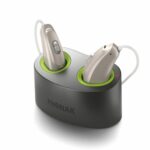Rechargeable hearing aids have become a high priority among users and providers in recent months. While they have been around for decades, recent technology enhancements have put them in high demand.
It was recently discovered that as many as 70 percent of hearing aid users would prefer rechargeable hearing aids over traditional models that require the batteries to be replaced. This is part of the reason rechargeable hearing aid batteries were such a highlighted item at the Consumer Electronics Show in Las Vegas.
All of this attention has resulted in companies making some major changes in their hearing aids and batteries. Over the past few months, companies have come out with several rechargeable hearing aids models that are smaller, charge quicker and last longer than ever before.
There are two main options when it comes to the batteries that are encased within rechargeable hearing aids: Lithium-ion and Silver-zinc.
Lithium-ion batteries have been used in electronics for years, but have been questioned for being used in hearing aids because they are flammable and have high toxicity levels. When used in hearing aid, lithium batteries are sealed and heavily wrapped to avoid leakage and other potential problems.
Silver-zinc batteries have the advantage of being non-toxic and non-flammable, and can also be recycled. They can also be smaller in size.
Regardless of which battery type that is used, companies have designed rechargeable hearing aids that last longer and have more features than ever before. Some of those features include 24-hour battery life, quick charges that give batteries up to six hours of life, and various life spans. All of these features are available in a variety of styles and models to fit almost every hearing need.
Here are just some of the rechargeable hearing aids that have been introduced in the last year:
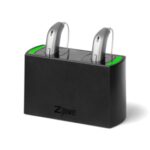 Oticon
Oticon
The new small, discreet miniRITE-T allows people with mild to severe-to-profound hearing loss access to Opn’s revolutionary open sound experience. With the easy-to-use charger, Opn miniRITE can now be powered throughout the day. This solution gives users the flexibility to interchange the rechargeable 312 batteries with disposable batteries if the user forgets to recharge.
Phonak
The Audeo B-R claims to be the longest lasting rechargeable hearing aid available today. With a battery life that last 24 hours when fully charged, there is also a quick charge feature that can give users a 6-hour battery life.
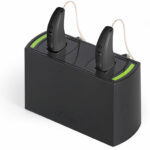 Starkey
Starkey
Winner of the CES 2016 Innovation Award Honor, the ZPower Rechargeable System has rechargeable batteries that only need to be replaced by a hearing specialist once a year.
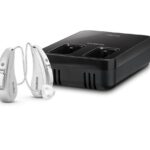 Signia
Signia
Signia’s Cellion has a 24 hours battery life even when streaming. It is also the only rechargeable hearing aid that is contact free, wireless and inductive.
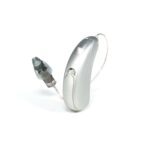 Unitron
Unitron
With the ability to replace 100 regular hearing aid batteries, the Moxi Fit R from Unitron is the smallest rechargeable hearing aid. It can last 24 hours and is able to stream for 90 minutes.
To learn more about your options for rechargeable hearing aids and which ones are best for you, contact Hearing Associates at 888-760-2032. You can also schedule an appointment at our main office in Mason City, or at one of our locations in Iowa and Albert Lea, Minnesota.
*Batteries contain materials that are both hazardous and recyclable. It’s good environmental stewardship to recycle them because you can recover their resources and keep contaminants out of the landfill. We are a hearing aid battery drop off site. We recycle all hearing aid battery sizes and brands. Mercury or Zinc, just bring them into any of our offices, and we’ll take care of them for you. Our environment is important to us.



